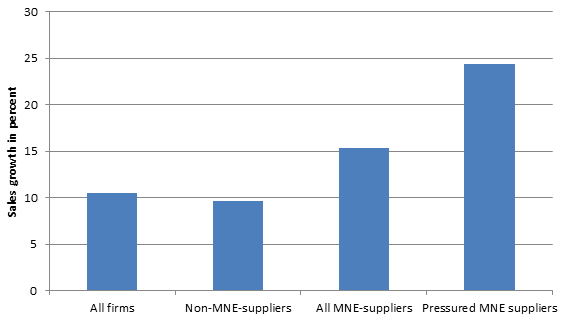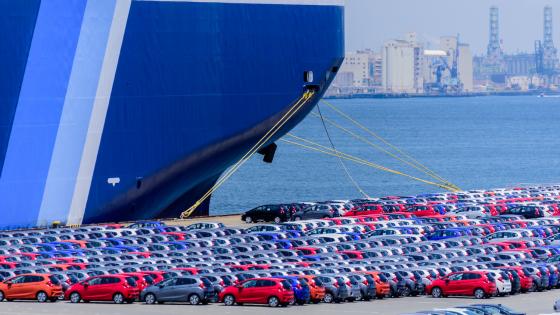It is empirically well established that multinationals raise productivity levels of their local suppliers in their host countries. Firm-level data show that productivity of upstream industries is the higher the higher the importance of multinationals in downstream industries is (e.g. Javorcik 2004, Barrios et al. 2011). More precisely, firm-level data show that firms that supply multinationals are more productive than firms that supply domestic customers only (Javorcik and Spatareanu 2009) and that suppliers to multinationals experience higher productivity growth the higher the shares of their sales to multinationals (Gorodnichenko et al. 2007). Our recent study (Godart and Görg 2013) for emerging economies in central and eastern Europe and central Asia has once more supports the observation of such backward spillovers from multinationals (Figure 1).
Figure 1. Sales growth of firms in emerging countries, 2003-05
As opposed to other studies that simply assume learning effects (e.g. Moran 2001), we conceptualise the underlying linkages from the multinationals to their local suppliers in a more differentiated way. They assume (i) that multinationals usually hold superior standards with respect to product features, delivery schedules, quality control, inventory holding and business procedures, (ii) that they require their suppliers to meet similar standards, and (iii) that they have the means to push the suppliers and to 'punish' them, if they do not comply. This is what we call a 'forced linkage effect', taking up a similar idea by Blomström and Kokko (1998).
As a theoretical background, some recent theories on imperfect contracts show how in a bargaining process the weight may shift in favour of the customer (Antràs 2003, Antràs and Helpman 2004, 2008). Normally, this would reduce the incentives for the supplier. As a result, one would expect the supplier to cut back his efforts, thereby shrinking productivity and depressing input prices such as wages in the home country. But given the said assumptions on multinational customers, these may in effect push technological progress and trigger productivity gains of the supplier. Also, after implementing the new technologies, the supplier may reach further customers, with expanding effects also on the supplier’s home country.
Linkages evidence from survey data
In our empirical analysis of technology transfer via such 'forced linkage', we draw on a rich firm-level dataset called “Business Environment and Enterprise Performance Survey”, provided by the World Bank and the European Bank for Reconstruction and Development. This survey contains questions to firm managers, inter alia, on whether their firm supplies multinationals (and how much) and on whether their firm perceives to be subject to pressure from customers to reduce production costs or to create new products. Relying on data from more than 1,000 supplier-firms that answered the survey questionnaires both in 2002 and 2005, we find the following characteristics:
- 14% of all firms were suppliers of multinationals, supplying on average roughly 23% of their output to multinational customers.
- The average firm among all firms had an increase in sales of about 11% between 2002 and 2005, while the average multinationals’ supplier had an increase of more than 15%.
- 30% of all firms reported to have developed a new technology with only 1.5% reporting help by their customers in developing the new technology. Multinationals’ suppliers were more likely to introduce new technologies (at 39%), and they were more likely to cooperate with their customers to obtain these new technologies (at 3%).
- Around 38% of all firms reported 'very important' pressure from their customers and 30% 'very important' pressure from their competitors. Multinationals’ suppliers felt pressured even more frequently, the respective figures being 42% regarding customers, and 37% regarding competitors.
- Among multinationals’ suppliers, those 42% reporting pressure from their customers on average experienced higher output growth in the subsequent periods; besides, they were more likely than 'non-pressured' suppliers to report pressure also from competitors.
- Comparing 'pressured' and 'non-pressured' suppliers, however, no obvious difference in the share of output sold to the multinationals was observed.
Pressure from multinationals leads to productivity increase
From our data we are able to estimate production functions tracing back the increased productivity in 2005 to the pressure exerted by the multinationals on the suppliers in 2002. More particularly, they estimate the change in sales between 2002 and 2005 conditional on changes in physical inputs (employment, fixed assets, and material inputs) and varying combinations of further exogenous variables. These exogenous variables include (inter alia) a dummy variable for serving multinationals, a variable on the share of output going to multinationals’ customers, a dummy variable for having acquired new production technology during the observation period, another one for having it acquired in cooperation with the customer, and two variables indicating reported pressure from customers and from competitors.
To proxy the 'forced linkage' effect, the dummy variable for serving multinationals is interacted with the variable indicating pressure from customers to yield the combination of feeling pressured by multinational customers. The calculations show:
- Neither the mere fact of serving multinationals, nor the acquisition of new technology, nor any pressure from the side of competitors had any significant influence on the productivity increase.
- Pressure from the side of customers in general generated negative effects on productivity; as expected, considering the reduction of incentives.
- Pressure from the side of multinational customers, proxied by the 'forced linkage' term, yielded a significantly positive influence on productivity, again as expected. The 'forced linkage' effect also holds in various specifications, controlling for other factors that may impact the supplier-customer relationship.
Policy implications
The overall result is thus that productivity gains only materialise for suppliers of multinationals when they are pressured by their customers to reduce production costs or create new products. Suppliers of multinational firms appear to be forced by their multinational customers to adopt some tough demands on product features and business interaction procedures that have a positive productivity effect. Such an effect of serving multinationals has largely been ignored by the recent literature on backward spillovers.
This adds a new policy relevant angle to the spillovers literature. Most of the studies on spillovers through backward linkages at least implicitly, if not explicitly, seem to be based on the assumption of a benevolent multinational that is willing to share knowledge voluntarily and instruct willing suppliers. While the new evidence does not indicate that this is not the case, the results suggest that the customer-supplier relationship may not always be so harmonious. Multinationals’ accumulated experience allows them to put pressure on their suppliers to improve production costs or create new products. While such pressure has also a productivity-reducing effect to the supplier, with potentially depressing extensions on the host economy, luckily the productivity-enhancing effect seems to prevail, at least for the countries observed. Thus the forced backward linkage, turns out to be to the benefit of the supplier, in terms of increased productivity growth, and thus also to the benefit of the host economy, in terms of overall expansion.
References
Antràs P, (2003), "Firms, contracts, and trade structure", Quarterly Journal of Economics 118, 1375-1418.
Antràs, P and E Helpman, (2004), "Global sourcing", Journal of Political Economy 112, 552-580.
Antràs, P and E Helpman, (2008), "Contractual frictions and global sourcing", in E Helpman, D Marin and T Verdier (eds.), The Organization of Firms in a Global Economy, Harvard University Press, 9-54.
Barrios S, H Görg and E Strobl, (2011), "Spillovers through backward linkages from multinationals: Measurement matters!", European Economic Review 55, 862-87
Blomström, M and A Kokko (1998), "Multinational Corporations and Spillovers", Journal of Economic Surveys 12, 247-277.
Godart, O and Görg, H (2013), "Suppliers of multinationals and the forced linkage effect: Evidence from firm level data", CEPR Discussion Paper 9324 (forthcoming in Journal of Economic Behavior & Organization).
Gorodnichenko Y, J Svejnar and K Terrell, (2007), "When does FDI have positive spillovers? Evidence from 17 Emerging Market Economies", IZA Discussion Paper 3079.
Gorodnichenko, Y, J Svejnar and K Terrell (2010), "Globalization and innovation in emerging markets", American Economic Journal: Macroeconomics 2, 194-226.
Javorcik, B (2004) "Does Foreign Direct Investment Increase the Productivity of Domestic Firms? In Search of Spillovers through Backward Linkages", The American Economic Review 94, 605-627.
Javorcik, B and M Spatareanu (2009), "Tough Love: Do Czech Suppliers Learn from their Relationships with Multinationals", Scandinavian Journal of Economics 111, 811-33.
Moran, T (2001), Parental Supervision: The New Paradigm for Foreign Direct Investment and Development, Washington, DC: Institute for International Economics.





